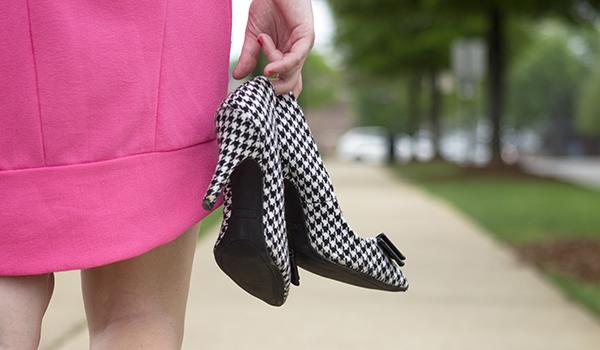The first time Jessica Hoffman, a sophomore majoring in special education, was called a slut, she was in the seventh grade.
“I had no idea what the word truly meant,” she said. “I just knew that it hurt my feelings and made me feel alienated. The more I learned what it meant the more confused I got because I had barely ever spoken to a boy. I felt worthless and cheap.”
Slut-shaming is defined as the act of making a person, especially a woman, feel guilty or inferior for expressing any form of sexuality that deviates from societal expectations. Looking back, Hoffman said she now understands she was slut-shamed because her body had developed faster than those of her peers, and the male attention she received caused girls in her grade to lash out. She said she did not understand why the boys in her class were not subject to the same bullying.
Jennifer Purvis, associate professor and director of women’s studies, said there is a double standard for men and women about sexual freedom, which stems from the first sexual revolution. The Food and Drug Administration approved the birth control pill in 1960 for contraceptive use. Purvis said this caused men to panic because for the first time, women had a choice.
“Men are seen as the neutral and the positive and women are seen as the negative, and what they do sexually is deviant,” she said. “It’s this idea that men have sex and women have babies. Women are only supposed to be used for reproduction, and they’re not supposed to enjoy or have pleasure or experience sexuality for themselves.”
Marissa Cornelius, a sophomore majoring in secondary education and social sciences, is a member of the Feminist Caucus, a student-led feminist activist group.
“[Slut] is one of those words that people use as a knife,” she said. “When they say it, they are intending to cut you and damage you.”
During her time at the University, Cornelius said she has been slut-shamed multiple times. The most recent incidentwas when a group of male students drove by her and yelled “slut” because she had been involved with a few of their friends.
“Once I was pursuing a guy and one of my friends knew him and she told him that I was interested in him,” she said. “When she asked why he wouldn’t go out with me, he said, ‘I don’t want to go out with her because she’s a slut, and I don’t want to be with somebody who’s used.’”
Lindsay Macher, a sophomore majoring in chemical engineering, said the first time she was hurt by the word “slut” was when she was in high school. After kissing a boy on their first date, she said her friend called her a slut and she felt condemned for her actions. Macher said she believes women are taught differently from men starting at a very young age.
“When I was little my parents told me that I could have the world and whatever I wanted,” she said. “Once I reached the age where everyone started to be sexual, that was when a shift occurred because they told me to be careful about how many guys I date. It went from ‘the world is yours,’ to ‘you need to be appealing to the world.’”
Slut-shaming affects many different women of all ages, including victims of sexual assault.
“Unfortunately victim blaming happens often in conjunction with sexual violence,” said Zoe Storey, coordinator of Take Back the Night, an event that brings awareness to sexual assault. “In order to move away from victim blaming, it is important to hold offenders responsible for their actions, not the victim. We should evaluate our personal actions and words and hold both ourselves and our peers accountable.”
Hoffman said it was not her male peers who slut-shamed her relentlessly, but her female peers. Even at the age of 20, Hoffman said women still call her a slut.
Cassidy Ellis, president of the Feminist Caucus, said women’s internalized misogyny causes them to call each other sluts. The Feminist Caucus will host “Helping Womyn Wyn: Ain’t I a Woman?” on Wednesday to discuss women’s empowerment and the idea of “having it all.”
“I feel like a lot of us called each other that,” said Ellis, a graduate student studying women’s studies and communications. “We would say ‘don’t be a slut’ or ‘you’re being a slut.’ It almost became a dated term growing up, and we might have said ‘whore’ or something like that. I have to admit that I’ve said it. I think we all have because we’re socialized to think it’s OK.”
Christopher Lynn, a biological anthropologist who teaches an anthropology of sex course at the University, said the intersexual competition between women contributes to women slut-shaming one another. Lynn said women are made to feel bad about sex because our American culture has a puritanical and Victorian basis.
“I think that in some ways jealousy, whether it’s slut or whore, it’s almost like telling someone, ‘you’re too free and I’m jealous of that,’” he said.
Hoffman said the word is no longer an insult to her and only reflects negatively upon the people who use it.
“If you are going to insult me, get to know me,” she said. “Call me out on something that actually matters.”







